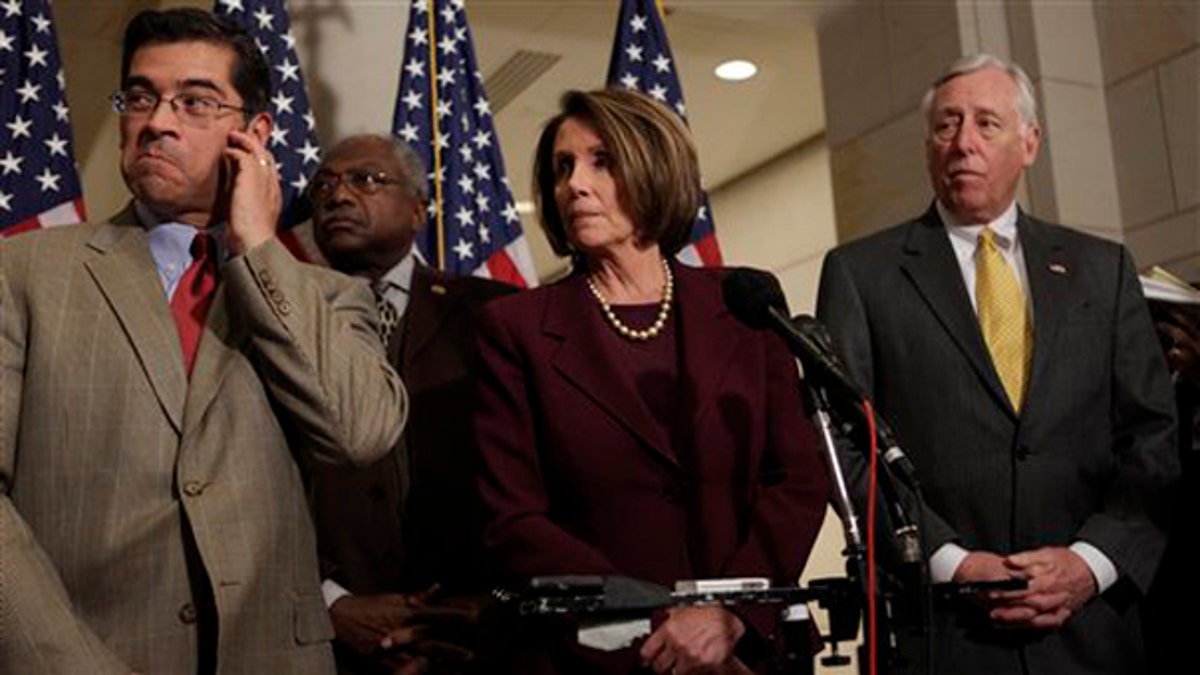
From left to right, Rep. Xaiver Becerra, D-Calif., Majority Whip James Clyburn, D-S.C., House Speaker Nancy Pelosi, D-Calif., and House Majority Leader Steny Hoyer, D-MD., speak to reporters Jan. 14 in Washington. (AP Photo)
In pushing a giant step closer to a health care reform deal, Democratic leaders are once again drawing fire from their critics for extending special treatment to an interest group in exchange for its support of the bill.
The latest deal was struck Thursday among the White House, Congress and union leaders over the proposed tax on high-value "Cadillac" health insurance plans."
Unions had objected strongly to the proposed tax on high-value insurance policies, fearing it would hurt their members, and they won several concessions from the administration. Under the deal, if it becomes law, union workers will be shielded from the 40 percent tax for five years -- until 2018. The threshold for the tax also was raised so that it will kick in for plans worth $24,000 instead of $23,000. And dental and vision coverage will not count toward that threshold.
But what about everybody else?
The unions, traditional supporters of the Democratic Party and a major factor in Obama's political infrastructure, got a deal, but Republicans said that non-union workers will still have to pay the tax from the get-go starting in 2013.
"I guess this bill is only good if it doesn't apply to you," GOPAC Chairman Frank Donatelli said.
"Millions of non-union workers ... would be forced to pay higher taxes for the same benefits their union counterparts" receive, Republicans on the House Ways and Means Committee said in a written statement.
The deal also leaves a $60 billion hole in the projected revenue stream, meaning Democrats will have to find the money elsewhere if they want to meet Obama's pledge to keep health care reform deficit-neutral.
"There's a $60 billion hole now in the legislation," Democratic strategist Doug Schoen said. "Not sure it's fair, not sure it's paid for."
Neither union leaders nor the White House offered any specifics on where that money would come from.
Lawmakers, though, have been considering applying Medicare payroll taxes to capital gains and other dividend incomes above $200,000 for individuals and $250,000 for families.
Critics of the legislation called the union deal another back-room favor handed out in secret talks that violated Obama's promise of transparency. They say special treatment has gone to interests ranging from the pharmaceutical industry to the state of Nebraska, which was offered extra federal funding for Medicaid patients in exchange for moderate Sen. Ben Nelson's support.
"If this bill is so good, why does everyone need an exemption in order to vote for it? ... We see the drug companies get a special deal. We see what happened in Louisiana and most notoriously Nebraska in the Senate where they got special deals. And now the unions get a special deal." Donatelli said.
"This union kickback is the latest in a long line of back-room pay-offs and sweetheart deals on a health care bill that the American people overwhelmingly do not support," Michael Steel, a spokesman for House Minority Leader John Boehner, said in an e-mail Friday.
But the White House trumpeted the "solid progress" it was making toward a final package.
Obama held a meeting with House and Senate Democratic leaders late into the night Thursday to discuss the apparent breakthrough.
House Speaker Nancy Pelosi said on Friday that her members, who were fiercely opposed to the earlier version of the Senate bill's "Cadillac" tax, liked what they saw in the union compromise.
"We are very optimistic" that common ground will be found on other issues, she said.
Gerald McEntee, president of the American Federation of State, County and Municipal Employees, said his workers were "very pleased" by the deal.
"They're ready to go out and fight for it and even improve it down line. We're for this health care reform and ready to fight for it."
AFL-CIO President Richard Trumka called the agreement the biggest hurdle for union support. Absent any last minute changes, he said the AFL-CIO's on board.
"We will endorse it and do it proudly," Trumka said of the emerging health care bill.
Fox News' Major Garrett and Trish Turner contributed to this report.




